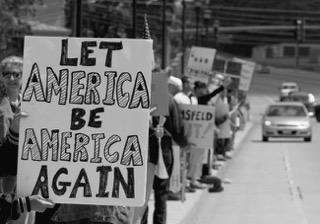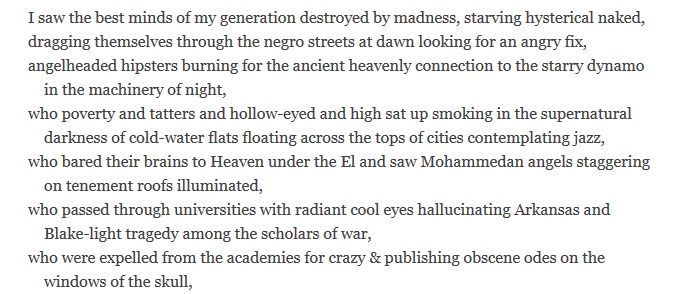“Who Made America”: Don Share, Danez Smith, and Viral Poets from the Archives

A recent interview between Megan Garber of The Atlantic and Don Share, editor of Poetry Magazine and Kingsley & Kate Tufts Poetry Awards judge, gave voice to the state and influence of poetry in the United States’ post-election moment. The interview, replete with aphorisms that could sometimes themselves qualify for poetry, spoke specifically of the viral distribution of poems in the election’s aftermath that was witnessed, for example, in the virality of Wendy Cope’s “Differences of Opinion.” This Atlantic article, paired with similar articles from The Guardian and The Huffington Post, points to Plato’s weighty assertion that “[p]oetry is nearer to vital truth than history”—for many, the deeply personal and emotional responses to the current political climate are often and best represented in poetry.
Considering Plato’s emboldened claim in the shadow of recent events sheds light on the power poetry has to narrate a nation’s emotional genealogy, both in response to the political state and otherwise. While the Internet and social media make the distribution of politically relevant poems more immediate and traceable, the socially profound tradition of poetry responding to politics extends far beyond the Internet Age. “Our greatest poets,” Share says in the interview, “have been active in what goes on in the world.” Borrowing this, Share’s belief in great poets, and Plato’s testimony of poetry’s epistemological and philosophical value, we end 2016 by taking a glance backwards to when American poetry has articulated its own temporality with a poignance unrivaled by the history books.
Emily Dickinson
The posthumous publication of Emily Dickinson‘s body of poetry complements its confessional nature, inviting readers to focus in on both its content and its context. For this reason, Dickinson’s effect on feminist, and specifically confessional feminist, poetry remains strong. Beyond her influence on the literary world, however, Dickinson’s poems provide a particular insight to the nineteenth century female experience. Poem #199 is no different as it challenges prescribed female roles, positing “wife” and “woman” as opposites.
I’m “wife”—I’ve finished that—
That other state—
I’m Czar—I’m “Woman” now—
It’s safer so—
How odd the Girl’s life looks
Behind this soft Eclipse—
I think that Earth feels so
To folks in Heaven—now—
This being comfort—then
That other kind—was pain—
But why compare?
I’m “Wife”! Stop there!
—#199 (1861)
Langston Hughes
In the year following the Harlem Race Riots and the poet’s own success as the first black playwright to debut a play for Broadway, Langston Hughes wrote “Let America Be America Again.” The poem is strikingly prophetic of today’s nationalism debates, skeptical of the American notion of Manifest Destiny and freedom for all. The conversation held in this poem, between Hughes and America, says as much about the US in the 1930s as it does for the US in the twenty-first century.
O, let America be America again—
The land that never has been yet—
And yet must be—the land where every man is free.
The land that’s mine—the poor man’s, Indian’s, Negro’s, ME—
Who made America,
Whose sweat and blood, whose faith and pain,
Whose hand at the foundry, whose plow in the rain,
Must bring back our mighty dream again.
Sure, call me any ugly name you choose—
The steel of freedom does not stain.
From those who live like leeches on the people’s lives,
We must take back our land again,
America!
—from “Let America Be America Again” (1936)
Allen Ginsberg
Allen Ginsberg‘s “Howl” is indisputably one of the most important and well-known poems of the twentieth century. Much of the poem’s historic influence is known and obvious—obscenity trials ironically have a way of grabbing more attention than they can ever deter—yet, the poem’s relevance extends beyond its own trial and subjectivity to paint a picture of a generation.
—from “Howl” (1955)
Maya Angelou
Nearly forty years since its publication, Maya Angelou‘s “Still I Rise” is one poem that has made its rounds in the viral poetry sharing since the election. Known for much more than her poems, Angelou’s unrelenting hope in spite of political chaos appears in all her work. This poem is timeless and persistent, situating the perils of American history next to the charge to rise up out of it—an empowering image then and now.
Out of the huts of history’s shame
I rise
Up from a past that’s rooted in pain
I rise
I’m a black ocean, leaping and wide,
Welling and swelling I bear in the tide.
Leaving behind nights of terror and fear
I rise
Into a daybreak that’s wondrously clear
I rise
Bringing the gifts that my ancestors gave,
I am the dream and the hope of the slave.
I rise
I rise
I rise.
—from “Still I Rise” (1978)
Danez Smith
Finally, among contemporary poets writing history into poetry is the politically reflective 2016 Kate Tuft’s Discovery Award recipient: Danez Smith. In his young but successful career, Smith has pointedly spoken up in moments of political or national distress (as was the case with his two poems on Ferguson published in 2014). In a poem published by Buzzfeed immediately after the election, Smith writes his election response into poetry.
but my honeyed kin
those brown folks who make
up the nation of my heart
only allegiance i stand for
realer than any god
for them i bury whatever
this country thought it was
—from “You’re Dead, America” (2016)
—Ashley Call
Share
